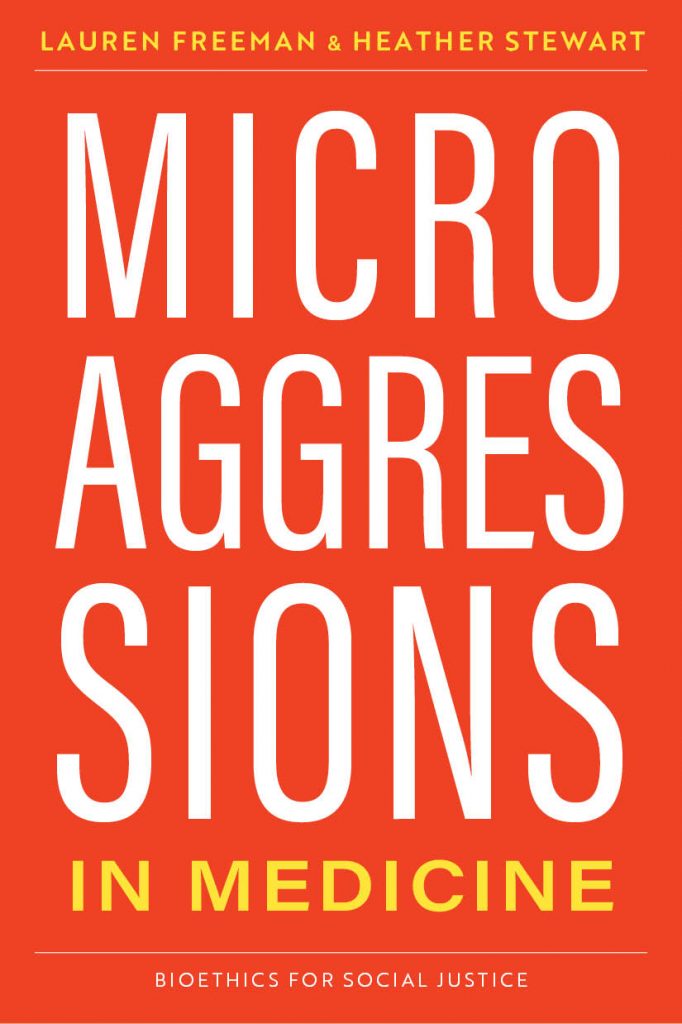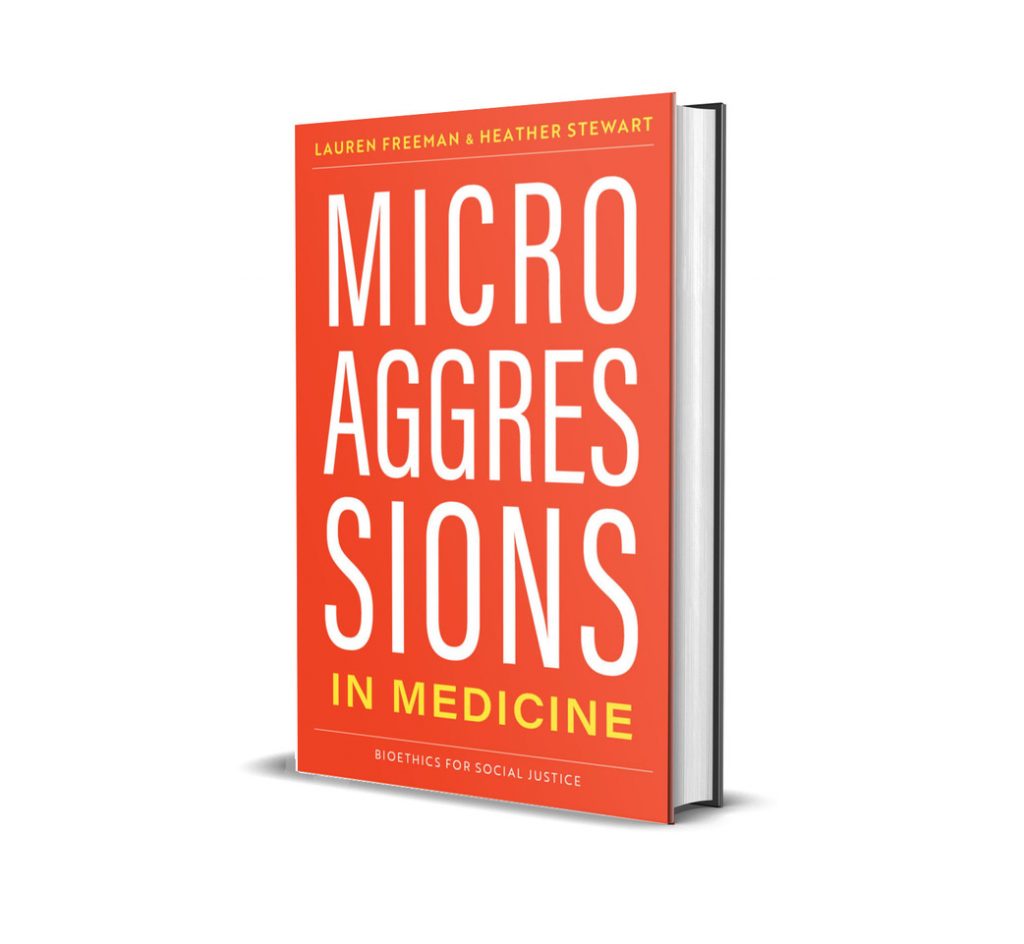In this installment of our IJFAB Blog Feminist Bioethics Spotlight Series we’re spotlighting a new book by Lauren Freeman and Heather Stewart just out this spring as part of the Bioethics for Social Justice Series with Oxford University Press. It is the second book in the series, after Keisha Ray’s fantastic Black Health. Read on for more about the new book, Microaggressions in Medicine, its feminist bioethics approach and their insights into feminist bioethics publishing.
What is the book’s main argument and who is your main audience?
The central argument of Microaggressions in Medicine is that microaggressions in medicine exist, cause serious harms, and thus, ought to be taken seriously and avoided. To that end, there are two main aims of the book: one theoretical and one practical.

The theoretical aim is to reconceptualize how microaggressions have been understood and conceptualized by psychologists and philosophers. By and large, research on microaggressions has centered around and been understood on the basis of the acts committed by microaggressing agents. We call this standard account the act-based account of microaggressions. We introduce a number of problems with this account and on the basis of them, we propose understanding microaggressions anew to center the harms experienced by those on the receiving end of microaggressions. To that end, we call our account the harm-based account of microaggressions.
The theoretical aim is to reconceptualize how microaggressions have been understood and conceptualized by psychologists and philosophers. By and large, research on microaggressions has centered around and been understood on the basis of the acts committed by microaggressing agents. We call this standard account the act-based account of microaggressions. We introduce a number of problems with this account and on the basis of them, we propose understanding microaggressions anew to center the harms experienced by those on the receiving end of microaggressions. To that end, we call our account the harm-based account of microaggressions.
The practical aim of the book is to develop our novel harm-based account of microaggressions in medical contexts. In so doing, we hope that readers will better understand what microaggressions look like in medical contexts and have a more robust sense of their harmful consequences. Finally, we develop strategies for healthcare professionals to implement in order to minimize microaggressions and their resulting harms. Overall, we hope that the book will help to build contexts in which health justice can be realized.
We have written this book to be broadly accessible, relevant, and useful to a wide range of readers. Current and future healthcare professionals, health advocates, those interested in health justice (and injustice) and health equity will find great value in the practically oriented chapters (chapters 4-6) that develop our harm-based account of microaggressions in medical contexts. Each of those chapters begins with a case study and builds our account by centering the experiences and testimonies of patients who are members of marginalized groups. Health care professionals and administrators will be interested in the chapter that outlines practical tips at the individual and institutional levels for minimizing microaggressions (chapter 7) and the conclusion that develop guidelines for how to respond once you realize that a patient has experienced a microaggression. Psychologists and philosophers will be interested in the chapters that outline, critique, and reconceptualize how microaggressions have been understood over the last 50 years and introduce our harm-based account (chapters 1-3). Most broadly, anyone who has ever been (or will someday be) a patient will be interested in the core chapters of the book that take an intersectional approach to analyzing cases of microaggression in medicine (chapters 4-6).
Although different sections of the book might be more directly relevant to different groups of readers, we have intentionally written it to be accessible to readers who are neither academics nor healthcare professionals. A novel contribution of Microaggressions in Medicine is that we amplify the stories and experiences of diverse patients who often get sidelined in mainstream bioethical and medical discussions. We hope that people who are members of these groups will see themselves in and relate to the stories we tell. Our hope is that in reading our book, they will feel less alone as they navigate their own healthcare experiences.
How did you decide to collaborate on this project? What was the inspiration for your book?
We have written about the genesis of our work together in the Women in Philosophy Series of the American Philosophical Association Blog. There, we discuss the importance of collaboration in philosophy, especially professor-student co-writing, publishing, and mentoring. Our collaborative relationship began a decade ago when Heather was a student in Lauren’s graduate seminar, Foundations of Bioethics. Over the course of the semester – both inside and outside of the classroom – we engaged in heated discussions and critiques of Beauchamp and Childress’s seminal text, Principles of Biomedical Ethics.
(Image of Heather Stewart provided by Dr. Stewart)

We were both struck by their underdeveloped, and at times, reductive, account of harm in medical contexts. We came to see how their account obscures many of the more subtle, insidious, and yet all-too-common non-physical harms that patients experience. We were invigorated to explore these subtle forms of harm and injustice that were missing from mainstream accounts of harm in bioethics and medicine.
This led us to engage with the psychological literature on microaggressions. Microaggressions gave us the conceptual language and framework for making sense of the kinds of acts, comments, and gestures that are unintentionally committed by healthcare professionals and often go unnoticed by them, but that result in real and enduring harm to patients in the form of damaged trust relations, worse health outcomes, and sometimes even avoidance of medical contexts and institutions. In traveling down the microaggressions path, we discovered that there had been almost nothing written about microaggressions in medicine and nothing at all written about microaggressions that patients experience. Although we ultimately moved away from framing the project as a critique of Beauchamp and Childress, at its core, the book still challenges traditional bioethics for its glaring lack of attention to the experiences of members of marginalized groups.

This is one reason why publishing our book in Oxford University Press’ new series, Bioethics for Social Justice, is so important to us. The series aims to bring greater attention to the healthcare experiences and needs of people and communities who are often ignored within mainstream bioethics.
Our vibrant discussions provoked by close textual reading in a graduate seminar resulted in a series of articles and book chapters (see here, here, and here) that organically, and over the last 8 years, became Microaggressions in Medicine.
(Image of Lauren Freeman provided by Dr. Freeman)
What feminist approaches do you take in the book?
At its core, Microaggressions in Medicine is a work in feminist bioethics. It is both inspired by and shares a lineage in that tradition in that it aims to bring feminist theories, concepts, methodologies, and insights to bear on issues in healthcare practice. Specific feminist theories and concepts that we employ include feminist theories of oppression; feminist theories of harm; the concept/methodology of intersectionality; feminist social epistemology (including feminist standpoint epistemology and literatures on epistemic injustice and gaslighting); feminist theories of emotion (e.g., anger); and feminist philosophies of medicine. We also draw on insights from queer and trans theory and philosophy, philosophies of disability, fat studies, and philosophy of race. We bring these important and diverse areas of philosophy into dialogue with other academic fields, most notably, with psychology.
In terms of our broader feminist commitments, the book centers the lived experiences of diverse patient groups by telling their stories in their own words. To this end, we draw heavily on first-person testimonies and narratives. In so doing, we amplify the voices of those who have experienced and who continue to experience injustice and harm in healthcare settings and who often lack a wide platform for telling those stories and especially, for having their stories heard by people in positions of institutional and medical power. We aim to carefully work with and through their voices and experiences to advocate for the advancement of health justice.
Has anything been especially surprising/challenging/fun about writing this book?
In many ways, writing the book was a difficult and heavy experience, as is all research that confronts harms that occur in medical contexts or that reflects on injustice and oppression more broadly. The book deals with many sensitive topics, and does so by telling people’s real, first-hand, often traumatic stories. This brings with it the duty of re-telling those stories responsibly, doing justice to the individuals and their experiences. This becomes especially tricky when engaging with experiences that are not our own or that we do not share. The moral issue of including testimonies and stories of others is something we reflected on and struggled with through the process of researching and writing the book and is something we desperately hope that we got right. We are so grateful to the many individuals who shared their stories with us in the name of fighting for health justice.
It is also worth noting that even while dealing with heavy topics and the responsibility of carrying and sharing others’ stories with proper care, we have found real joy in the process of collaborating. At the end of this project, we are at a place of shared hopefulness about having planted seeds which we believe can help move the needle closer to health and social justice. We feel that hope every time people share with us how they relate to the stories we tell in the book and see their own experiences reflected in the cases we discuss, how our work made them feel less alone in their own health struggles, how we have given them the language to better understand and make sense of their experiences, or how grateful they are that we are doing this work. We feel optimism when healthcare professionals tell us that our ideas have made them see their own habits in a new light and that they are changing their practices or revising some of their language on account of having reflected on the tips and strategies that we develop. Ultimately, that is why we do this work. In the face of many challenges and difficulties, our readers fuel us to persevere.
Do you have any advice for scholars publishing in feminist bioethics?
Our main advice would be to seek out supportive communities of scholars, mentors, and editors who believe in your project and who will raise you up (while also offering critical feedback to improve the project and to ensure that it is achieving your aims). Part of this requires clearly delineating what your goals are by asking questions like, for whom am I writing (for patients, practitioners, philosophers, students)? and what do I want this project to accomplish? Having clear answers to these kinds of questions can help determine how you want to write (i.e., in a more academic or technical way vs. for a more popular audience) and where you want to place your work (in an academic philosophy journal, a medical or bioethics journal, in a textbook that students will be more likely to read, or as an op-ed or blog).
In our case, for example, we started out writing a highly academic book about microaggressions that waded deep into the weeds with regards to technical distinctions and nuances in the philosophical and psychological literatures on the topic. A few years into the writing process, however, and on the basis of some harsh, though ultimately extremely helpful feedback on early versions of our work, we realized that we did not actually want to be writing a book that would only appeal to and be read by academic philosophers and psychologists. We came to see that we really wanted to write a book for healthcare professionals and patients, since that is where we thought our work could have the greatest impact. Coming to this realization was difficult (since it required us to completely rewrite many chapters and to delete more words than we care to (re)count). But in the end, it was a liberating experience and resulted in much stronger and more impactful work. For editorial support, guidance, and sometimes, some tough love, we are grateful to Quill Kukla and Sean Valles, the editors of the Bioethics for Social Justice Series at Oxford University Press, and to Lucy Randall, our editor.
Relatedly and more broadly, we have found that having supportive communities is especially important when working on heavy topics, or topics which are deeply personal to yourself, your communities, or communities you care about. Reading about, reflecting on, and ultimately writing and speaking about people’s real experiences of medical harm, trauma, and injustice is, as we mentioned, extremely weighty and emotionally taxing. It is thus important to have a supportive community to let you know that it is okay to step back when you need to and to help you keep the larger goal – health and social justice – front and center, even when things feel heavy, difficult, or impossibly insurmountable. We are very grateful to have had each other and our shared feminist philosophy communities as we have developed this project over the years, and we look forward to being part of those supportive communities for others developing important projects in feminist bioethics!
Thanks so much Lauren & Heather for writing this book and sharing about it and the writing process with us!


